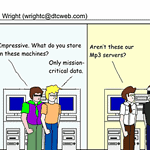
From Superosity, by Chris Crosby.
The Free Software Foundation has announced that they are working on an update to the GNU General Public License. The proposed revisions aren’t available for review yet (and won’t be until early 2006) but they’re already talking about a few of the changes, and one change in particular is provoking a lot of worry and speculation. The FSF is trying to downplay the extent of the changes, but at the same time they come across as just a little bit defensive when it comes to defending their right to update the license.
One particular change is causing some concern both within and outside of the free software community, and only time will tell if this change is going to go into the actual revision, or be abandoned as part of the FSF’s own “practice movie.” If it does get included, however, it suggests that the FSF is narrowing its focus. Some of its ideals aren’t co-existing very well, so one of them is getting downgraded from “core belief” to “looks nice on paper.”
Ideological triage: the unfortunate result of a successful revolution.
For the purpose of this discussion let’s ignore the differences within the free software community. Let’s ignore the practical and ideological differences between free software and open source software, and the spats between the various factions within each group, the personality conflicts, the feuds, the betrayals, the meltdowns, and all the other things that make gossip so much fun. That’s much too complicated to get into at the moment, and this article can’t afford to get any longer than it already is. We’re talking specifically about the GPL, the GPL was specifically created to further free software, and all the other groups, whether they like it or not, exist because the GPL came first.
I don’t care what kind of peg you are. This article is a round hole, and I have a very big hammer.
The terms of the GPL are a little difficult to understand in its native tongue, but to its credit it speaks a much clearer dialect of Legalese than most software licenses. The license spells out the rights you are granted concerning the use and distribution of a program that uses it. Under its terms, you are allowed to examine and modify the program’s source code… but if you distribute that code for any reason, you must make the modified source code publicly available to whomever you distribute it to, free of charge.
In other words: if you change something for your own use, you are not required to make those changes available. If you change something and allow others to use those changes, you must provide them access to the source code so that they may do the same.
But, claim some, there is a fly in the ointment. A new business model has appeared that seems to skirt around these requirements, and — they claim — subverts the very essence of what the GPL is trying to do. This supposed loophole is that the GPL puts restrictions on the distribution of source code, but not on how that source code is used. So if a company modified a GPL-Licensed web application — an application that ran on one machine, and one machine only — they could charge people who wanted to log into that machine and use that application, without making the source code available. They aren’t distributing the program, you see… they’re just using it.
As it happens, this fly in the ointment has turned into something of a viable business model today. Companies like Google, Yahoo!, and Amazon.com — companies that provide services over the web, as opposed to software — all run software licensed under the GPL. They all have modified that software, optimized it to fit their specific needs… and as far as I know, none of those specific optimizations have made their way back into the free software community. Why not? Because those changes aren’t being distributed. They’re running on servers sitting in each company’s headquarters.
This, some say, is a loophole that absolutely must be closed. When it was created, no-one ever envisioned that “web services” would be as prevalent as they were today. No-one understood that it could actually be profitable for companies to make money in such a manner. This unintended consequence is a result of the fast-changing face of business in the computer age, and it needs to be fixed before it renders the GPL irrelevant.
The problem with this view is that, well, it’s completely wrong.
This supposed “loophole” in the GPL has been known about for at least six and a half years — that’s when I first became aware of it — and at the time it was very specifically described as not a loophole at all, but as a consequence of liberty.
And who described it this way, you ask? I’ll tell you: it was Richard M. Stallman — the man who wrote the GPL and fathered the entire Free Software movement.
Let me take you back to January, 1999. A developer of a web application is considering using the GPL as the license for his product, but he’s concerned about something:
But there is a problem… Imagine this…
1) We distribute our web software under the GNU copyleft
2) Big company X, takes our software adds extensions to it, builds a web site around it, and they puts our site out of business.
This is exactly the “loophole” that everyone is talking about today, and that the changes in v3 of the GPL are supposed to “fix.” But on January 14, Richard Stallman posted this response on gnu.misc.discuss:
It is definitely possible for someone to make a modified version of a free program, and not release it.
However, it would be misleading to describe this as a problem with the GNU GPL in particular, because the same is true for any free software license, including the MIT Scheme license that you use now.
In some cases, I would agree that it is antisocial to make a useful modification and not release it. But if a license made that illegal, if a license did not allow people to make and use their own private changes, without publishing them, I would consider the license unacceptably restrictive. People should always have the right to share with their neighbors, but compelling people to share can be wrong, especially when it conflicts with privacy rights.
Still don’t believe me? You can read the entire discussion right here.
It’s not that they didn’t think it was a problem. There are always problems attached to freedom. One could argue, very persuasively, that one of the essential costs of freedom is that you have to put up with people using it in ways that piss you off. Richard Stallman’s post made it fairly clear that he wasn’t in favor of the situation, but he was also very clear that, in his view, there was a greater principle at stake.
So what changed?
A lot of things changed. Software products licensed under the GPL or another free software license have become an integral part of the internet, are working their way into the corporate world, and are even being officially adopted by governments. At the same time, companies who are reluctant to fully embrace the ideals of that movement are trying to find ways around it.
Some are beyond reluctant — some are positively desperate to try to find a way to “break” the free software movement, and the GPL in particular. SCO went so far as to try and (unsuccessfully) claim that the GPL was Unconstitutional.
Companies don’t like it when you tell them they’re not allowed to profit off of your work without compensation. They don’t like it because it’s one of their most profitable business tactics. The GPL is, in essence, beating these companies with their own schtick.
So the FSF can be forgiven for paranoia where their baby is concerned. They don’t want to rest on their laurels, and quite rightly so — complacency makes it more likely that a dastardly villain will find a way around the license that renders the entire thing moot. The next thing you know, the GPL is tied to the railroad tracks, the villain holds the mortgage ransom, and there is no square-jawed hero on hand to save the day.
On the other hand, it’s hard to shake the notion that if they do go down this route, they are essentially trading liberty for security. The FSF has always been very up-front about the fact that they are an organization that pursues an ideology of freedom rather than a development model. Is the situation so dire, then, that they must sacrifice a piece of that ideology in order to save a greater part? Or are they simply distracted by the annoyance of someone using that freedom to their benefit without sharing their good fortune with the free software community as a whole?
I admire the FSF, and regardless of what they ultimately decide to do I suspect I’ll continue to admire them. That said, I find I agree with the Richard Stallman of 1999 more than I agree with their current rumblings concerning this “loophole,” and I think calling it a loophole is inappropriate considering the author’s previous stance. Liberties of any kind are prone to misuse precisely because they are liberties, and the freedom to behave only within rigidly defined boundaries isn’t really freedom. In order for that word to have meaning, it must anticpate and, at least to a certain extent, tolerate offensive behavior.
Closing this “loophole” doesn’t seem like an act that promotes freedom. It seems a lot closer to the behavior of proprietary, non-free organizations who consider any use of technology that interferes with their goals as an act of piracy.
I’m going to resist the temptation to quote Ben Franklin, since I’ve already sort of alluded to the quote in question and it’s become somewhat cliched of late (though not a whit less true for all its over-use). Instead, I’m going to run off somewhere to hide while the teeming masses of angry free software developers marshall their forces against me. And as I run, gibbering in fear, certain of the knowledge of my impending doom, I ask: if this change goes through, what freedom is being protected? Under the current terms of the license, what freedom is being lost?


